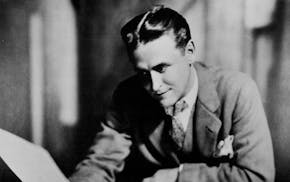Opinion editor's note: Strib Voices publishes a mix of commentary online and in print each day. To contribute, click here.
•••
Much has been said about the DFL's "trifecta" domination of Minnesota government — the party's control of both legislative chambers as well as the governorship since 2023. But this summer Minnesota Democrats achieved a still more unusual level of institutional supremacy. Sticking with a gambling metaphor, we might call the DFL's newly commanding position in Minnesota "four of a kind."
With the recent appointments of Associate Justices Sarah Hennesy and Theodora Gaitas, all seven members of the Minnesota Supreme Court are now appointees of DFL governors — Tim Walz and his predecessor, Mark Dayton. Records at the State Law Library indicate that the entire membership of the state's highest tribunal hasn't been unanimously hand-picked by politicians of one party since the 1920s.
And while Democrats conceivably could lose one leg of their "trifecta" in November's election — their House of Representatives majority — they face virtually no danger of relaxing their total grip on the state high court, even though three of the court's seven members will be on the ballot next month.
Welcome back to the curious world of judicial selection in Minnesota, a complicated, largely unofficial but consistently reliable system in which, contrary to the old saw, elections hardly ever have consequences.
Regular Minnesota voters are accustomed to a puzzling spectacle when they examine their judicial ballot — a long list of judges standing for re-election, about whom they've heard little or nothing, who carry no party label, and nearly all of whom face no opponent while being helpfully labeled as the "Incumbent" (unlike any other officeholders on the ballot).
Hundreds of thousands of Minnesota voters commonly ignore these "races," even the ones that include a challenger.
As in just under half of all the states, Minnesota's Constitution calls for judges to be elected. But it also provides for the governor to appoint a replacement when a judge creates a "vacancy" by leaving office before the end of his or her term.
The thing is, a pattern has long since evolved in Minnesota for nearly all judges to voluntarily retire in midterm and create a vacancy. The result is that nearly all state judges are initially appointed by governors, who choose from among experienced lawyers, some with political ties of varying intensity.
Only three of the last 50 justices to serve on the Minnesota Supreme Court were initially elected. A Supreme Court incumbent hasn't been defeated in a re-election bid since 1946 — and no incumbent has ever been ousted from the state Court of Appeals, Minnesota's second highest court, established 40 years ago.
When state judges come before voters for re-election on those odd judicial ballots they seldom, as noted, face challengers and even more seldom are they challenged by prominent opponents running vigorous, well-funded campaigns. It's possible to wonder whether lawyers would do their legal careers any favors by challenging a sitting judge. Meanwhile, the state court system's code of conduct strictly limits what candidates for judgeships can say about their legal or political philosophies.
This is despite the fact that in 2002 the Minnesota Republican Party won a U.S. Supreme Court ruling striking down the even stricter limits that were then imposed on judicial speech in Minnesota. Little has actually changed.
None of this is accidental. A strong, largely bipartisan consensus has long existed in Minnesota's legal and political establishment that courts should be insulated from partisan political pressures and public passions. Many point with alarm to the harsh, big-money partisan politics that have consumed judicial elections in some other states, notably Wisconsin, undermining confidence in the impartiality and integrity of courts.
Nearly everyone agrees that there is no perfect way to balance independence with accountability among judges — to simultaneously empower them to fearlessly and impartially uphold the law while holding them responsible if they don't. Clearly the life-tenured appointment/confirmation process in the federal courts hasn't eliminated discontent.
Various reforms, some in place in other states, have been proposed in Minnesota — notably a "retention" election system, in which appointed judges who perform poorly could be removed by voters and replaced by a new gubernatorial appointee. But nothing's come of such efforts. Minnesota's courts have for the most part avoided politically charged divisions and incendiary rulings.
So Minnesotans seem largely satisfied, if also frequently mystified, with what David Hann, chair of the state Republican Party, calls the state's "wink and a nod" judicial selection system, which gives mainly unchecked power to governors to choose the state's judges while leaving voters with few choices and little information. GOP rules allow for endorsements and recommendations of judicial candidates, Hann says, but the "cumbersome" process has made this rare in recent years.
The DFL, for its part, "does not endorse in judicial races," says communications director Darwin Forsyth, allowing that the state party may not be aware of all unapproved communications among local party units. The party, he adds, encourages voters to consult a preference poll of lawyers conducted by the State Bar Association.
•••
As it happens, Minnesota voters will see a few more contested judicial races than usual this year. Two of three Supreme Court races have challengers; one Court of Appeals seat is contested out of seven on the ballot; and challengers are running for six of 93 district court seats. It's quite a lively campaign compared with 2022, when only one judgeship was contested out of 117 up for grabs.
Herewith, some basic information on this year's contested judicial races:
Supreme Court, Chief Justice
Natalie Hudson, the incumbent, is broadly experienced, having practiced law for 42 years in both the private and public sectors, including with the state attorney general's office and as city attorney in St. Paul. She was initially appointed to the bench in 2002 by third-party Gov. Jesse Ventura. She joined the Supreme Court in 2015 and was named chief justice in 2023.
Stephen Emery says on his campaign website that he has worked in the legal field for 28 years, mainly in "legal analysis and writing." He has run for public office several times and in 2022 was elected county attorney in Yellow Medicine County. But he resigned before taking office. Emery's website emphasizes his determination "to address the economic slavery of today through the corporation and government" and to limit judges "to administrative functions only."
Hudson received 93% of the vote in the Minnesota State Bar Association's poll of attorney members.
Supreme Court, Associate Justice
Karl Procaccini was appointed to the Supreme Court in 2023, after serving four years as Gov. Tim Walz's general counsel and deputy chief of staff. Before that he was a law professor, clerked for two federal judges and was a partner at the Greene Espel firm in Minneapolis. His appointment drew some criticism from Republicans over Procaccini's close political ties to Walz and the administration's COVID-19 policies, and from environmentalists over his work representing a mining firm and other corporate clients. But Procaccini has received abundant bipartisan support from former Supreme Court justices, business leaders and others.
Matthew Hanson was the one challenger of a Minnesota judge in 2022 and says he's running this year because "voters should have a choice." He is not raising campaign funds. His legal practice has focused on estate planning, wealth management, debt collection and research work.
Procaccini received 89% of the vote in the statewide bar association poll.
Court of Appeals, Seat 12
Diane Bratvold, the incumbent, practiced law for 26 years, mainly civil litigation and appeals, before being appointed a district judge in 2014 and to the appeals court in 2016 by Gov. Mark Dayton.
Jonathan Woolsey, a corporate and contract lawyer, did not respond to requests for more information.
Bratvold received 93% of the vote in the statewide bar association poll.
Second District Court, Seat 3
Timothy Carey was appointed to the district court in 2022 after serving 23 years as a probation officer and prosecutor in Ramsey County. A member of the court's Behavioral Health Team, he has long focused on legal issues involving mental illness and impairment.
Paul Yang, whose website refers to extensive legal experience and work in community leadership, did not respond to inquiries seeking more specific information.
Carey received 94% of the vote in the local bar association poll.
Second District, Seat 29
Timothy Mulrooney, before appointment to the bench in 2016, worked more than 20 years as a prosecutor, in family law practice and as a family court referee. He is co-chair of the district's Mental Health Gap Workgroup.
Winona Yang, a 2021 graduate of Mitchell Hamline Law School, is a community organizer determined to help minority and low-income residents gain trust in and access to the legal system. Minnesota Court Records Online do not list any appearances as counsel.
Mulrooney received 91% of the vote in the local bar association poll.
Fourth District, Seat 24
Matthew Frank, appointed in 2023, practiced law for more than 30 years, 20 of them as a prosecutor in the Attorney General's Office, managing the criminal division for 16 years. He was a lead prosecutor in the high-profile 2021 trials of police officers Derek Chauvin and Kim Potter.
Christopher Leckrone is a business and nonprofit lawyer and volunteer advocate for foster children and the guardian ad litem program that represents children in family court. He suggests the bench would benefit from more judges with experience outside criminal law.
No bar association poll has been conducted in this race.
Sixth District, Seat 6
The most unusual sort of judicial race in Minnesota, an open seat, has unfolded in the Arrowhead region since Judge Dale Harris announced he would retire at the end of his term. Not surprisingly, this rare move has produced an unusually interesting contest. Two finalists survived a five-candidate primary and will face off Nov. 5:
Gunnar Johnson has practiced law for 28 years, largely in the public sector. He was Duluth City Attorney for 12 years, managing an office of 16, and before that was in-house counsel to the Iron Range Resources and Rehabilitation Board. He resigned as Duluth City Attorney in 2020 after an investigation into internal frictions produced mixed findings and became "a distraction." Johnson narrowly won the August primary over the field of five.
Shawn Reed has been a trial lawyer in northeastern Minnesota for 27 years, appearing in court nearly every day, he emphasizes, as a prosecutor, defense counsel, in civil litigation, divorce and custody cases, etc. He highlights his courtroom concentration as the key to his candidacy.
Reed received 69% of the vote and Johnson received 31% in the local bar association poll.
Seventh District, Seat 5
Timothy Churchwell, the incumbent, was appointed by Gov. Mark Dayton in 2017, after 28 years in diverse private practice, including extensive work as a public defender and a municipal attorney for small communities in central Minnesota.
Joel Novak served 15 years (1993-2008) in the U.S. Army Judge Advocate General's Corps as a prosecutor, defense counsel and commissioner. His private practice is focused on criminal and family law. He has held a variety of Republican Party posts over the years.
Churchwell received 93% of the vote in the local bar association poll.
10th District, Seat 3
Helen Brosnahan was appointed to the district court in Stillwater in 2022 after 27 years as a public-sector attorney, mainly with the Dakota County Attorney's office, where she practiced in both the criminal and civil divisions.
Nathan Hansen, a solo practitioner since 2003 with a diverse law practice, describes himself as a Republican activist. He appeared in several challenges to elements of the Walz administration's COVID-19 policies. He says he is a candidate because voters should fill the seat he is running for. He carries a recommendation from the 10th Judicial District Republican Committee.
Brosnahan received 84% of the vote in the local bar association poll.



